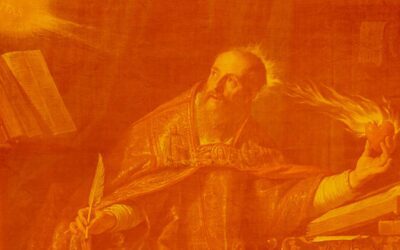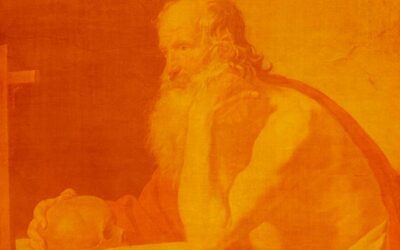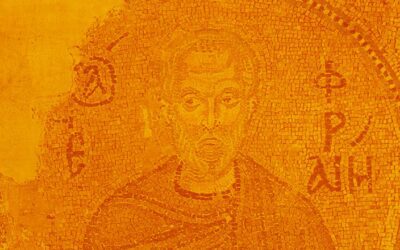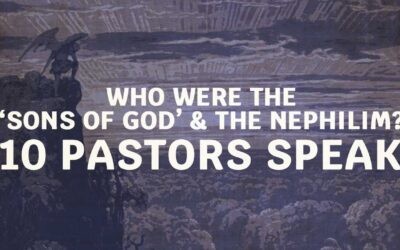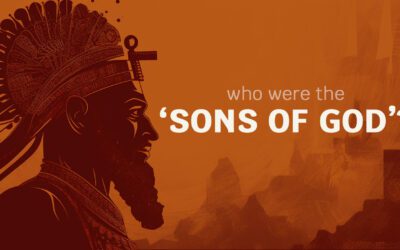A Jewish philosopher’s unique Nephilim story
Philo of Alexandria was a Jewish philosopher and writer who lived in Alexandria, Egypt during the time of Christ.
In two of his writings, Philo relates the Genesis 6:1-4 story. However he focuses on the perceived symbolism of the story, making it debatable as to his exact thoughts on the original event.
the Angels and Giants in Philo’s Writings
“And when the angels of God saw the daughters of men that they were beautiful, they took unto themselves wives of all of them whom they chose.”
“Those beings, whom other philosophers call demons, Moses usually calls angels; and they are souls hovering in the air.
“And let no one suppose, that what is here stated is a fable, for it is necessarily true that the universe must be filled with living things in all its parts, since every one of its primary and elementary portions contains its appropriate animals and such as are consistent with its nature…”
Philo of Alexandria On the Giants
“Question: On what principle it was that giants were born of angels and women? (Ge 6:4).
Answer: The poets call those men who were born out of the earth giants, that is to say, sons of the Earth.“But Moses here uses this appellation improperly, and he uses it too very often merely to denote the vast personal size of the principal men, equal to that of Hajk{12}{hajk is an addition of the Armenian translator; it is the name of a fabulous patriarch of the Armenian nation.} or Hercules.
“But he relates that these giants were sprung from a combined procreation of two natures, namely, from angels and mortal women; for the substance of angels is spiritual; but it occurs every now and then that on emergencies occurring they have imitated the appearance of men, and transformed themselves so as to assume the human shape; as they did on this occasion, when forming connexions with women for the production of giants.
“But if the children turn out imitators of the wickedness of their mothers, departing from the virtue of their fathers, let them depart, according to the determination of the will of a depraved race, and because of their proud contempt for the supreme Deity, and so be condemned as guilty of voluntary and deliberate wickedness.”
Philo of Alexandria Questions
WHO WAS PHILO AND WHEN DID HE LIVE?
Living from approximately 20 BC to 50 AD, Philo of Alexandria was a fascinating Jewish philosopher and theological writer that overlapped with the life of Jesus.
He lived in Alexandria, Egypt, which had a large Jewish population.
Although much about his life is unknown, many of his writings were preserved. His diplomatic mission to the emperor Gaius Caligula on behalf of the deteriorating situation of Alexandrian Jews among growing strife with local Greeks is confirmed years later by Josephus.
Philo’s approach to scripture was largely influenced by second-temple ideas and Greek philosophy, where Philo believed there were influences and similarities.
Philo believed that many Greek concepts had grown from a foundation of God’s truths. Some believe he tried too much to harmonise his theology with Greek philosophy, although compared to later gnostic thinkers, his attempts were relatively tame.
What did Philo Believe about the Identity of the Sons of God and Nephilim?
In his commentaries on Genesis, Philo of Alexandria gives some fascinating insights into his perspectives on the identity of the ‘sons of God’ and ‘giants’ in Genesis 6.
In his chapter ‘On the Giants’, Philo seems to take more interest in delving into the symbolism and deeper meaning of the story than in the story itself.
“And when the angels of God saw the daughters of men that they were beautiful, they took unto themselves wives of all of them whom they chose.”
Philo of Alexandria
Philo was an Alexandrian Jew, so he spoke and wrote in Greek. His use of the phrase ‘angels of God’ indicates his use of the Septuagint translation into Greek that also used that phrase.
In the first century, Philo (c. 20 BC–AD 50) quoted from a version of the Septuagint that used “angels of God.” The Septuagint used by Josephus (c. AD 37–100) also used “angels of God.”
Since these men read “angels of God” in the Septuagint, this wording cannot be attributed to a later copyist error made by a Christian scribe.
Tim Chaffey Fallen: The Sons of God and the Nephilim
The oldest exegetical position on the identity of “the sons of God” is that they were fallen angels. This is the view assumed in the earliest Jewish exegesis, for example, in 1 Enoch 6:2ff. and in Jubilees 5:1.
Similarly, certain variants of the Septuagint, including Codex Alexandrinus, translate בְנֵי־הָאֱלֹהִים as ἄγγελοι τοῦ θεοῦ (“angels of God”).
The Jewish historian Josephus (37–c. 100) also assumes this view in The Antiquities of the Jews, as does the Jewish philosopher Philo (c. 25 BC–c. AD 50) in De Gigantibus.
Answers Research Journal, Lee Anderson Is the “Sons of God” Passage in Genesis 6 Adapted Pagan Mythology?
Philo doesn’t challenge the identity of the Angels of God, but rather doubles down on the definition, making sure his readers will understand that these beings are not unique to the Jewish worldview, but that they exist in other worldviews, and are simply known by different names.
Those beings, whom other philosophers call demons, Moses usually calls angels; and they are souls hovering in the air.
PHILO OF ALEXANDRIA
And let no one suppose, that what is here stated is a fable, for it is necessarily true that the universe must be filled with living things in all its parts, since every one of its primary and elementary portions contains its appropriate animals and such as are consistent with its nature…
Philo considers it necessary to take some time to defend the rationality of the idea that we and our world cannot be the only plane of sentient existence in the universe.
It seems that he is writing to respond in advance to the materialistic sceptics of his time.
It is therefore necessary that the air also should be full of living beings. And these beings are invisible to us, inasmuch as the air itself is not visible to mortal sight.
PHILO OF ALEXANDRIA
But it does not follow, because our sight is incapable of perceiving the forms of souls, that for that reason there are no souls in the air; but it follows of necessity that they must be comprehended by the mind, in order that like may be contemplated by like.
He goes on to say that what we generally consider ethereal air is not empty. He writes about how ‘tainted’ air results in sickness, and that when the wind blows, and fresh air comes, health returns.
He views this as evidence that even the invisible air contains real entities that affect our lives. Just because we do not see them, doesn’t mean they are nonexistent. Interestingly, Jesus used a similar illustration in John 3 with Nicodemus…
This gives evidence to Philo’s argument that real beings exist beyond our sight, and that they are necessary to exist, not imagined.
Will he get to the point?
A few more paragraphs in, and Philo has yet to expound on any details of the actual Genesis 6 story itself. He’s more concerned with how this relates to our understanding of the makeup of God’s creation as a whole.
A potential complication is introduced when Philo begins to write about how this relates to humanity’s condition. And it seems that he equates the angels with the wicked.
But as men in general speak of good and evil demons, and in like manner of good and evil souls, so also do they speak of angels, looking upon some as worthy of a good appellation, and calling them ambassadors of man to God, and of God to man, and sacred and holy on account of this blameless and most excellent office; others, again, you will not err if you look upon as unholy and unworthy of any address.
PHILO OF ALEXANDRIA
And the expression used by the writer of the psalm, in the following verse, testifies to the truth of my assertion, for he says, “He sent upon them the fury of His wrath, anger, and rage, and affliction, and he sent evil angels among Them.
In this next part, Philo seems to indicate that the story may be referring to wicked men taking the name of ‘angels’.
“These are the wicked who, assuming the name of angels, not being acquainted with the daughters of right reason, that is with the sciences and the virtues, but which pursue the mortal descendants of mortal men, that is the pleasures, which can confer no genuine beauty, which is perceived by the intellect alone, but only a bastard sort of elegance of form, by means of which the outward sense is beguiled; and they do not all take all the daughters in marriage, but some of them have selected some of that innumerable company to be their wives; some choosing them by the sight, and others by the ear, others again being influenced by the sense of taste, or by the belly, and some even by the pleasures below the belly…”
Jaap Doedens in his incredibly in-depth dissertation about the ‘Sons of God’ has this to say about whether Philo took this story as an actual event or just an allegorical representation of reality.
According to Philo, the ‘sons of God’ in Gen 6:1–4 are angels, the very same beings whom – in the vocabulary of Philo – philosophers other than Moses call ‘demons’.
He refrains, however, from relying on a naturalistic explanation by allegorising the passage such that the angels are evil spirits. These spirits inspire wicked men who are not “acquainted with the daughters of right reason, that is, with the sciences and virtues”, to pursue all sorts of bodily pleasure.
The ‘giants’ are a representation of men ‘born of the earth’ who devote themselves to earthly pleasures, in contrast with men born of heaven (the philosophers and learned) or born of God (priests and prophets). In this way, the whole treatise becomes a warning not to pursue earthly pleasures but to seek instead genuine beauty and virtue.
Jaap Doedens The Sons of God in Genesis 6:1-4
Mr. Doedens warns us not to conclude anything too definite about Philo’s views on the actual event being referenced since Philo seems to vacillate between the allegorical and literal so vaguely.
However, Philo previously insisted that the original characters were indeed ‘angels’ that other philosophers knew as demons.
When he says that the wicked take the name of angels and pursue women, he’s not claiming that the events of Genesis 6 happened this way, but that it is a fact of our reality that men will do these things in the same pattern as the angels actually took women in Genesis – men will give themselves exalted titles but then pursue the lusts of the flesh in spite of those titles.
This is confirmed by another of Philo’s writings where Philo stays more on topic and directly deals with the Genesis 6 event itself and the nature of the giants themselves.
Philo and the Giants of Genesis 6
In Philo’s ‘Questions’, he employs an interesting format that’s a lot like a Q&A – a lot of short questions and direct answers.
One of these questions is about the identity of the giants and if they were born of an intermingling of angels and women.
Question: On what principle it was that giants were born of angels and women? (Ge 6:4).
Answer: The poets call those men who were born out of the earth giants, that is to say, sons of the Earth.
But Moses here uses this appellation improperly, and he uses it too very often merely to denote the vast personal size of the principal men, equal to that of Hajk{12}{hajk is an addition of the Armenian translator; it is the name of a fabulous patriarch of the Armenian nation.} or Hercules.
But he relates that these giants were sprung from a combined procreation of two natures, namely, from angels and mortal women; for the substance of angels is spiritual; but it occurs every now and then that on emergencies occurring they have imitated the appearance of men, and transformed themselves so as to assume the human shape; as they did on this occasion, when forming connexions with women for the production of giants.
But if the children turn out imitators of the wickedness of their mothers, departing from the virtue of their fathers, let them depart, according to the determination of the will of a depraved race, and because of their proud contempt for the supreme Deity, and so be condemned as guilty of voluntary and deliberate wickedness.
Philo’s Questions
Here Philo leaves no doubts as to his interpretation of the original events, despite the symbolism he implies from the event in other writings.
Jaap Doedens also addresses this, agreeing that here Philo seems to take a more matter-of-fact approach to the material.
Philo’s Questions and Solutions on Genesis explains the meaning of giants born of angels and women. Here Philo focuses more on the sensus litteralis; the angels are understood as adopting a human form in order to engage in connections with women.
For Philo, Gen 6:1–4 is not a myth about the birth of giants but is a narrative of how humanity is divided into three levels: the ones who are born of earth, the ones who are born of heaven, and the ones who are born of God.
Jaap Doedens The Sons of God in Genesis 6:1-4
Then Philo concludes his answer by giving us his take on the meaning behind the term ‘sons of God’, which is consistent with how most understand it.
But sometimes Moses styles the angels the sons of God, inasmuch as they were not produced by any mortal, but are incorporeal, as being spirits destitute of any body; or rather that exhorter and teacher of virtue, namely Moses, calls those men who are very excellent and endowed with great virtue the sons of God; and the wicked and depraved men he calls bodies, or flesh.
PHILO OF ALEXANDRIA
Interesting that he ends by saying that Moses sometimes calls ‘excellent’ men ‘sons of God’, but doesn’t elaborate or give any references in scripture where this is done.
PHILO AND THE GIANTS
It should be noted that Philo continues to expound from his Greek scriptures, and doesn’t delve into the original Hebrew word Nephilim itself, which was translated simply as ‘giants’ in his scriptures.
Let us now return to ‘On the Giants’, where Philo then begins to talk about them after winding down his extensive defence of the existence and necessity of spiritual beings and exploration into humanity’s battle between flesh and spirit.
‘And there were giants on the earth in those Days.’
Perhaps some one may here think, that the lawgiver is speaking enigmatically and alluding to the fables handed down by the poets about giants, though he is a man as far removed as possible from any invention of fables, and one who thinks fit only to walk in the paths of truth itself; in consequence of which principle, he has banished from the constitution, which he has established, those celebrated and beautiful arts of statuary and painting, because they, falsely imitating the nature of the truth, contrive deceits and snares, in order, through the medium of the eyes, to beguile the souls which are liable to be easily won over.
Therefore he utters no fable whatever respecting the giants; but he wishes to set this fact before your eyes, that some men are born of the earth, and some are born of heaven, and some are born of God: those are born of the earth, who are hunters after the pleasures of the body, devoting themselves to the enjoyment and fruition of them, and being eager to provide themselves with all things that tend to each of them.
Those again are born of heaven who are men of skill and science and devoted to learning…
Philo of Alexandria On the Giants
Again, Philo insists that Moses was only concerned with speaking the truth in this passage. He defends Moses against those who would insist that he was just relating common legends about giants. He doesn’t elaborate, but his readers would have been very familiar with the Greek myths of the giant titans who warred against the gods and then were defeated and cast into Tartarus.
Philo is adamant that Moses isn’t just repeating or trying to allude to such ‘fables’, but that Moses wants to teach us something from this event that most certainly wasn’t a fable.
Without questioning or expounding upon the original event, Philo then dives into what he’s most passionate about – how this story relates to all mankind, and that some men are ‘born of the earth’ in that they pursue materialistic goals. At the same time, others are ‘born of God’ who seek the reason and knowledge that comes from God.
So this is somewhat unhelpful if we’re looking for more conclusive evidence in our investigation of Genesis 6.
Fortunately, his comments on the giants in ‘Questions’ help out yet again.
But he relates that these giants were sprung from a combined procreation of two natures, namely, from angels and mortal women; for the substance of angels is spiritual; but it occurs every now and then that on emergencies occurring they have imitated the appearance of men, and transformed themselves so as to assume the human shape; as they did on this occasion, when forming connexions with women for the production of giants.
Philo of Alexandria Questions
Conclusion
We need to keep in mind that Philo wrote 2,000 years ago, and had no interest in resolving this issue for us. He had other ideas and concerns on his mind, so we shouldn’t be surprised that he does not attempt to neatly resolve our questions.
Philo seems to accept the story as it was commonly known in his time – angels had ‘transformed themselves’ into physical form, married and the result of that intermingling had produced the ‘giants’.
He doesn’t question the tale or treat it differently than other stories in Genesis. This would indicate that he didn’t view it as controversial.
2nd Temple writings such as the Book of Enoch were probably familiar to him, although it is telling that he never mentions Enoch by name or uses direct quotes.
In fact, he doesn’t mention anything outside of what his Greek translation of Genesis gives him. From this, it’s possible to assume that he didn’t have sources like Enoch to draw from, or that he didn’t hold their elaborations upon Genesis in high regard.
He seems much more interested in defending Moses against claims during his time that Moses was simply retelling common mythology, as other secular writers were doing (Diodorus Siculus in his Bibliotheca historica, Ovid and his Metamorphoses, and prior by Sanchuniathon the Phoenician historian, and Hesiod in his Theogeny).
Several times, Philo indicates that other cultures and mythologies tell similar stories of demons and giants.
Perhaps some one may here think, that the lawgiver is speaking enigmatically and alluding to the fables handed down by the poets about giants…
PHILO OF ALEXANDRIA
After defending Moses as a superior source of truth over competing tales of our origins, Philo seems more interested in exploring the symbolism and allegories of the story instead of commenting on the actual realities what is being related.
He then makes the story out to be symbolical of the human battle between the allures of the flesh and the higher calling of the spiritual.
He uses the word giants, but is unconvinced that these were physically large offspring. Rather, he’s fascinated by the dual nature of these men ‘born of the earth’ but with fathers that were not originally earthborn.
All this, instead of causing confusion, can help us form a timeline of how people understood the story of Genesis 6.
It’s a long and fascinating timeline spanning millenia, and we’re working hard to piece it together and find answers to one of the oldest questions – who were the ‘sons of God’ and the nephilim?

